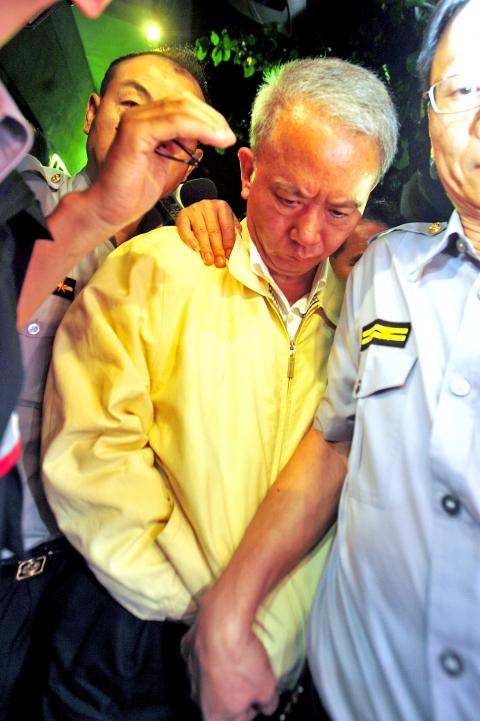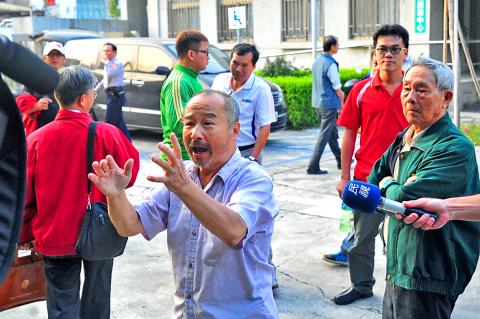|
Court detains Wei Ying-chun, official
TOO LATE? Legal experts slammed the detention of the senior Ting Hsin executive as having more value as a public relations exercise than any meaningful effect
By Jason Pan, Stacy Hsu and Chien Li-chung / Staff reporters

Wei Ying-chun, a senior Ting Hsin International Group executive, is taken to the Changhua District Prosecutors’ Office for questioning yesterday.
Photo: Liao Yao-tung, Taipei Times

A man claps hands outside the Changhua District Court yesterday after the court finally decided to detain Wei Ying-chun, a senior Ting Hsin International Group executive.
Photo: Liao Yao-tung, Taipei Times
The Changhua District Court yesterday ordered the detention of senior Ting Hsin International Group (頂新集團) executive Wei Ying-chun (魏應充), as well as a senior Ting Hsin official, and that they be held incommunicado.
The order arose from an adulterated cooking oil scandal that has caused the nation’s third major oil scare in a year.
Wei, former chairman of Cheng I Food Co (正義), Ting Hsin Oil and Fat Industrial Co (頂新製油實業) and Wei Chuan Foods Corp (味全食品工業), was summoned to the Changhua District Prosecutors’ Office for questioning on Thursday evening, along with Tseng Chi-ming (曾啟明), the plant manager of Ting Hsin Oil and Fat Industrial’s main operation in Pingtung County.
The bail hearing at the Changhua District Court yesterday lasted seven hours.
It resulted in the judge ordering Wei and Tseng to be detained and held incommunicado, citing the necessity to prevent them colluding and destroying evidence.
The court statement said that the two executives are suspected of contravening the Act Governing Food Sanitation (食品衛生管理法), and of committing fraud for illegal gains.
Wei denied any wrongdoing and maintained his innocence.
Chief prosecutor Lin Han-chiang (林漢強) cross-examined Wei about account book entries and company documents signed by senior executives, according to the prosecutors’ office.
Wei’s arraignment also caused controversy, as he seemingly received special privileges by not being handcuffed and entering the court through a back door, thus avoiding a crowd that had gathered in front of the courthouse.
A statement by the prosecutors’ office said that Wei had reported to the authorities to co-operate with the investigation, and as such the suspect did not need to be in handcuffs.
However, this point was disputed by legal experts.
Critics said the government’s response to the latest food scare was irresponsible.
Wu Ching-chin (吳景欽), associate professor of law at Aletheia University, said detaining Wei had more public relations value than any meaningful effect.
“The judiciary moved against him only because of the prevailing mood in society to boycott Ting Hsin products,” Wu said. “The judicial system is still practicing ‘selective prosecution’ based on politics.”
“The Taipei District Prosecutors’ Office has been investigating an earlier tainted cooking oil matter for more than a year, but had shown very little progress. Now, because most people are fed-up and angry over the latest scandal, the district prosecutors sprang into action and showed some efficiency,” Wu said.
“So what has the investigation achieved in the past year?” he added.
After the coordinated search and seizure by 12 district prosecutors’ office units, resulting in confiscation of evidence and the detention of Ting Hsin executives on Thursday, the Changhua District Prosecutors’ Office was appointed as the main judicial body to investigate the cooking oil scandal.
According to officials, local judicial offices must comply with the investigation progress and timeframe set by the Changhua District Prosecutors’ Office when questioning key suspects and reviewing evidence.
Separately yesterday, the Pingtung County Government’s Public Health Bureau imposed a NT$50 million (US$1.7 million) fine on Ting Hsin Oil and Fat Industrial for using animal feed oil in the production of its cooking oil products.
“Since January 2012, Ting Hsin Oil had imported 26 batches of lard oils from Vietnam weighing a total of 3,216 tonnes. The lard oils were only meant for animal feed, yet the company not only processed them into cooking oil products, but also sold them to the public,” the bureau said.
The practice violated Article 15, Item 1 of the Act Governing Food Safety and Sanitation, which is punishable by a maximum fine of NT$50 million, it said.
source: Taipei Times
|